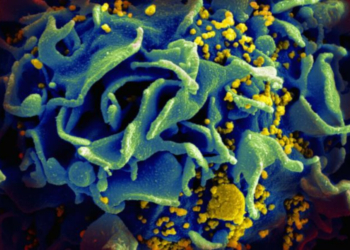Immune cells against glandular fever may hold the key to treating multiple sclerosis, scientists have claimed.
In a small trial, patients with MS were implanted with T-cells that target the virus that causes glandular fever.
Brain scans suggested the progression of the condition was slowed down or even reversed some sufferers.
Patients who yielded results also had ‘sustained disability improvement’, including being able to walk with less pain.
T-cells were extracted from people who had recovered from Epstein-Barr virus, which has been touted as a possible cause of MS.
US scientists who did the research accept the study was small and could not rule out the placebo effect — when someone feels better simply because they expected to.
But it could mark a significant step forward in experts’ understanding of MS, which is currently incurable and can only be managed with drugs.
Scientists are still not exactly sure of what causes the disease that affects around 130,000 people in the UK and more than 900,000 Americans.

Immune cells designed to fight glandular fever could hold the key to reversing multiple sclerosis, scientists have claimed. Pictured: An illustration of the Epstein-Barr virus, which causes glandular fever
It comes after a major study by Harvard scientists of 1million soldiers found EBV could be the main cause behind multiple sclerosis (MS) — with EBV patients 32 times more likely to develop it.
The crippling condition is caused by someone’s immune system attacking nerve cells, resulting in symptoms that include fatigue and difficulty walking.
Progressive MS occurs in one in 10 patients, and involves the condition to deteriorate consistently over time with no relapses. There are very few treatment options.
The new T-cell therapy has been created by US firm Atara Biotherapeutics, based in San Francisco, California.
It involves extracting immune cells known as ATA188, which are found in people who have successfully fought off Epstein-Barr.
It is given to people via injections.
The American immunotherapy company trialled the drug on an initial 24 MS patients for a year in 2017.
Patients were drawn from across the US and Australia and were given different doses of the immunotherapy drug to assess its effects.
The cells were donated by people who had suffered an EBV infection and were immunologically matched to the patients — to avoid rejection.
Eighteen participants continued the trial for up to more than three years as of August 2021 — seven of which already showed signs of improvement.
Researchers used scans to look at nerve damage in the brain as a result of MS and graded patients’ physical condition using the expanded disability status scale (EDSS).
The findings were presented at a conference on March 22.
It is not clear how regular doses were given to patients, or how much of the drug they were injected with.
Twenty of the original 24 given the injections saw their condition improve or stabilise after a year.
After three years, nine also had improvements when measured on using brain scans.
Professor Mark Freedman, a neurologist at the University of Ottawa who was not involved in the trial, said a natural reversal in progressive MS is incredibly rare — suggesting the Atara trialled therapy was behind improved outcomes.
He said: ‘When a patient reaches a certain level of advanced disability, it is rare for them to naturally revert, and any improvement that is sustained would not be expected from the natural history of the disease.
‘With progressive MS, spontaneous remyelination without therapeutic intervention is unlikely, highlighting the impact that these MTR data provide suggesting remyelination may be driving the prolonged sustained EDSS improvement.’
But others suggested further research is needed before people get too excited about the treatment.
The Phase I trial did not test against a control variable, with researchers admitting results could be caused by the placebo effect.
Clare Walton, head of research at the Multiple Sclerosis Society UK, told New Scientist: ‘It’s encouraging that they’ve seen improvements in MTR
‘But we’ve seen treatments look promising at phase I or even at phase II, but then when you do the large randomised trials they don’t show any outcome.’
Atara is currently conduction a phase II trial on 80 people, which is the next stage in the drug development process.
Dr Manher Joshi, chief medical officer at Atara, said: ‘There is growing robust evidence that EBV-infected B cells and plasma cells play a critical role in the pathogenesis of multiple sclerosis.
‘These data on progressive MS, the population with highest unmet need, underscore the potential to halt or reverse disability progression by precisely targeting what may be a root cause of MS.’
Around 95 per cent of people alive today have been infected with EBV, which causes mononucleosis
The virus is also believed to be behind several autoimmune disease, including chronic fatigue syndrome and encephalomyelitis.
Immune systems can become confused when EBV attaches to nerves, and start attacking the body’s own cells rather than the virus.
Because the virus can remain dormant in the body for long periods undetected and occasionally reactivate, this immune response can occur time and time again.














